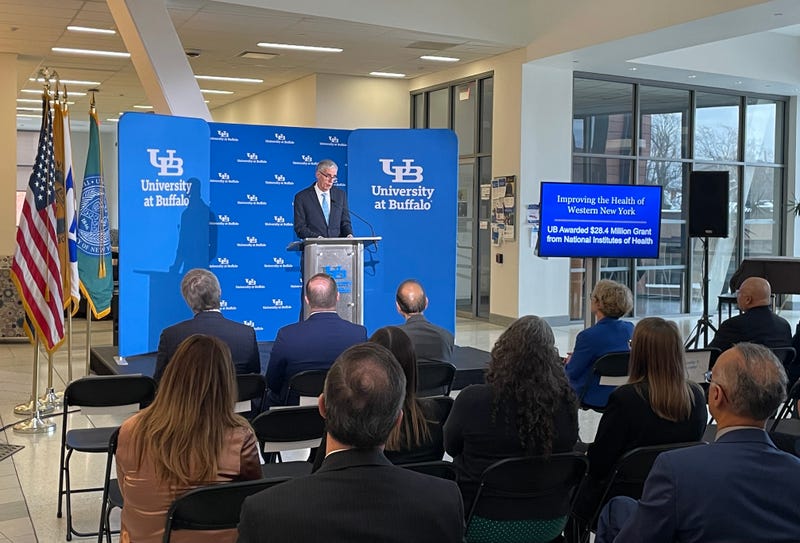
Buffalo, N.Y. (WBEN) - The University at Buffalo (UB) has, once again, been rewarded a federal grant that will benefit the Jacobs School of Medicine and Biomedical Sciences and their research to help improve the lives of many across Western New York.
The National Institutes of Health (NIH) has awarded UB a $28.4 million Clinical and Translational Science Award (CTSA) renewal grant over seven years to build on its extensive record of success using the power of research that goes towards improving health outcomes, and addressing health disparities throughout the region.
It is the third CTSA grant that UB has received under the NIH’s National Center for Advancing Translational Science program. The first was awarded in 2015 and the second was received in 2020. Friday’s announcement brings UB’s total CTSA funding over the last 10 years to just over $65 million.
The purpose of the CTSAs, awarded to only 63 institutions nationwide, is to speed the translation of research discoveries into improved care for all while prioritizing the needs of the most vulnerable members of the community.
"This landmark award reaffirms UB’s stature as a premier public research university that is committed to contributing meaningfully to the health and well-being of the communities we serve," said UB President Satish Tripathi during Friday's announcement. "It recognizes both the dramatic progress our UB faculty researchers have made in accelerating critical breakthroughs into enhanced patient care and our enormous potential to continue developing cutting-edge innovations and interventions in the interest of a healthier, more equitable society."
The work of the CTSA is accomplished through close collaborations among researchers throughout UB — including its six health sciences schools and Roswell Park Comprehensive Cancer Center — 15 collaborating institutions and influential community partners, which comprise the Buffalo Translational Consortium.
"This grant illustrates the opportunities created by partnerships between the federal government and our public research institutions like the University at Buffalo," said Congressman Tim Kennedy (D, NY-26) on Friday. "By delivering research that better reflects our populations as a whole, especially at-risk demographics, UB is on the cutting edge of improving health care outcomes here in Western New York and across the nation. This is exactly the type of investment we need to see more of as we continue to strengthen the Buffalo Niagara Medical Campus and our region’s health care systems."
"This grant represents a recognized commitment on the part of NIH to look at who’s actually doing the work on the ground that matters in communities that are underrepresented or unrepresented," added Rev. Kinzer Pointer, PhD, pastor of Buffalo’s Liberty Missionary Baptist Church and a member of the CTSI Community Advisory Board. "It recognizes those who are walking day to day with people through the challenges they face, who are helping them not only better understand their health, but are actively involved in recovering and maintaining their health."
These connections have helped Western New York respond to some major challenges, according to Timothy F. Murphy, MD, SUNY Distinguished Professor, principal investigator and director of UB’s CTSI.
"Because of the powerful community connections we have, we reduced the proportion of fatalities in African Americans during the pandemic, one of few communities nationally to achieve and sustain this," said Murphy during Friday's announcement.
A key factor in addressing health disparities involves diversifying the pool of people involved in clinical research. In 2023, with assistance and expertise from the CTSI, more than 24% of participants in UB clinical research studies were from underrepresented groups.
"Nationally, that number is less than 10%," Murphy said. "We have far exceeded the national average in engaging people who historically have not had the opportunity to participate in clinical research."
To encourage novel approaches to health challenges, the CTSA funds pilot projects; the program has a remarkable 11-to-1 return on investment in attracting major external funding.
In partnership with the Community Health Worker Network of Buffalo, the CTSA will also provide funding to develop a curriculum and train community health workers in clinical research. These workers, trained in translating research goals for the general public, will work with patients in local Tops Markets and independent pharmacies in underserved areas in Buffalo.
Other projects supported by the renewal include:
- Integrating artificial intelligence through connections with UB’s Institute for Artificial Intelligence and Data Science and using AI in a wide range of efforts. These include enhancing health literacy in communicating with potential research participants and improving the use of electronic health records (EHRs) in Western New York.
- Expanding the nationwide reach of “Sofia Learns About Research,” the multilingual children’s activity book and video game that presents research in a fun, age-appropriate way. At Buffalo’s Explore and More children’s museum, the Sofia game has been played more than 200,000 times.
- Speeding targeted drug discovery through the innovative Computational Analysis of Novel Drug Opportunities (CANDO) platform developed by Jacobs School researchers. CANDO has led to the formation of three startup companies and won a national challenge on novel ways to develop drugs to fight opioid addiction.
- Leveraging UB’s international leadership in ontology, the study of organizing and categorizing knowledge, to enable greater common understanding, UB is leading a national network of CTSA hubs to establish new ontologies for the social determinants of health and other subfields.
